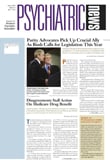Not unexpectedly, the current economic crisis in Argentina is having a deleterious effect on the incomes of Argentine psychiatrists just as it is having a baleful impact on the incomes of most everyone else in the country.
Néstor Koldobsky, M.D., a professor of psychiatry at the University of La Plata in La Plata, Argentina, has not received a salary for several months, he told Psychiatric News.
“Many of our patients have stopped coming for treatment because they have trouble paying for their visits,” Pablo Gabay, M.D., a University of Buenos Aires psychiatrist, said in an interview. “Still other patients beg us to give them discounts.”
“It is a very hard situation for all Argentines, and psychiatrists are included,” added Mordechai Benyakar, M.D., a professor of psychiatry at the University of Buenos Aires and the University of Tel Aviv in Israel. “When patients cannot pay, it has a domino effect on psychiatrists who are in private practice, and most Argentine psychiatrists are in private practice.”
The incomes of Argentine psychiatrists are likewise impaired by health insurance companies’ delays in reimbursing them for their services, Luis Ellerman, M.D., secretary of the Argentine Psychiatric Association, pointed out.
Eduardo Val, M.D., a San Diego psychiatrist, has one brother in Argentina who is a psychoanalyst and another who is a gastroenterologist. “Insurance companies owe them money for six or seven months,” he said, “and they don’t think that they are ever going to get their money.”
All in all, Argentine psychiatrists have seen their incomes drastically reduced, not just by patients’ decreased buying power and insurance companies’ tardiness in paying claims, but by the government’s devaluation of the peso, Rodrigo Muñoz, M.D., a San Diego psychiatrist and former APA president, explained. And since Argentina has more psychiatrists than any other country in South America, the financial deprivation that Argentine psychiatrists are experiencing is a setback for Latin American psychiatrists in general, Muñoz asserted.
In fact, one might even consider their financial plight a defeat for world psychiatrists since, as Val pointed out, Argentina has the highest ratio of psychoanalysts and psychotherapists per person in the world.
Also, it is certainly not easy for Argentine psychiatrists to try to help their fellow citizens psychologically when their own minds and hearts are dramatically affected by what is transpiring in their country.
“Psychotherapy sessions evolve around the current situation in which all Argentines, therapists and patients alike, are immersed,” Ellerman admitted. “It creates very peculiar situations in which we all share the same doubts and uncertainties.”
Benyakar agreed: “Patients and therapists are under the same threats, and this gives a special flavor to the therapeutic encounter.”
“All of us Argentines are involved in the same process,” declared Rodolfo Fahrer, M.D., Ph.D., chair of mental health at the University of Buenos Aires. “It is the worst crisis in the history of Argentina, breaching every rule and value.”
